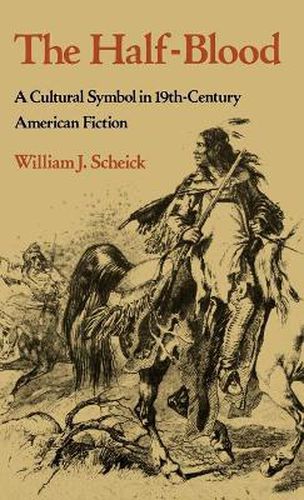Readings Newsletter
Become a Readings Member to make your shopping experience even easier.
Sign in or sign up for free!
You’re not far away from qualifying for FREE standard shipping within Australia
You’ve qualified for FREE standard shipping within Australia
The cart is loading…






The half-blood – half Indian, half white – is a frequent figure in the popular fiction of nineteenth-century America, for he (or sometimes she) served to symbolize many of the conflicting cultural values with which American society was then wrestling. In literature, as in real life the half-blood was a product of the frontier, embodying the conflict between wilderness and civilization that haunted and stirred the American imagination. What was his identity? Was he indeed half Indian, half white, and half devil – or a bright link between the races from which would emerge a new American prototype? In this important first study of the fictional half-blood, William J. Scheick examines works ranging from the enormously popular dime novels and the short fiction of such writers as Bret Harte to the more sophisticated works of Irving, Cooper, Poe, Hawthorne, and others. He discovers that ambivalence characterized nearly all who wrote of the half-blood. Some writers found racial mixing abhorrent, while others saw more benign possibilities. The use of a half-blood in spirit – a character of untainted blood who joined the virtues of the two races in his manner of life – was one ingenious literary strategy adopted by a number of writers, Scheick also compares the literary portrayal of the half-blood with the nineteenth-century view of the mulatto. This pioneering examination of an important symbol in popular literature of the last century opens up a previously unexplored repository of attitudes toward American civilization. An important book for all those concerned with the course of American culture and literature.
$9.00 standard shipping within Australia
FREE standard shipping within Australia for orders over $100.00
Express & International shipping calculated at checkout
The half-blood – half Indian, half white – is a frequent figure in the popular fiction of nineteenth-century America, for he (or sometimes she) served to symbolize many of the conflicting cultural values with which American society was then wrestling. In literature, as in real life the half-blood was a product of the frontier, embodying the conflict between wilderness and civilization that haunted and stirred the American imagination. What was his identity? Was he indeed half Indian, half white, and half devil – or a bright link between the races from which would emerge a new American prototype? In this important first study of the fictional half-blood, William J. Scheick examines works ranging from the enormously popular dime novels and the short fiction of such writers as Bret Harte to the more sophisticated works of Irving, Cooper, Poe, Hawthorne, and others. He discovers that ambivalence characterized nearly all who wrote of the half-blood. Some writers found racial mixing abhorrent, while others saw more benign possibilities. The use of a half-blood in spirit – a character of untainted blood who joined the virtues of the two races in his manner of life – was one ingenious literary strategy adopted by a number of writers, Scheick also compares the literary portrayal of the half-blood with the nineteenth-century view of the mulatto. This pioneering examination of an important symbol in popular literature of the last century opens up a previously unexplored repository of attitudes toward American civilization. An important book for all those concerned with the course of American culture and literature.